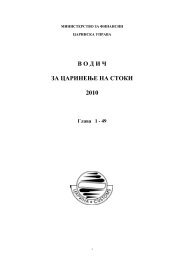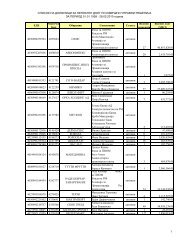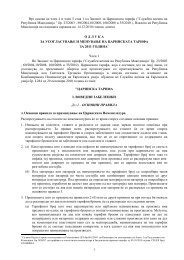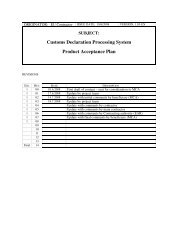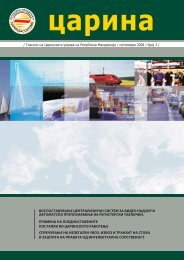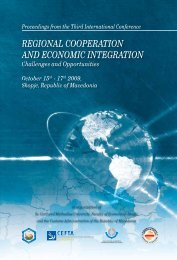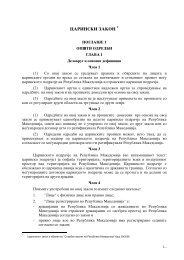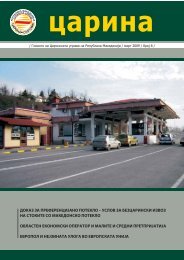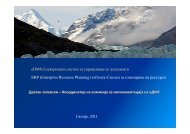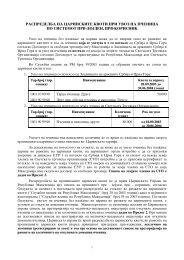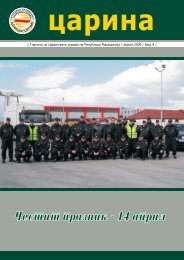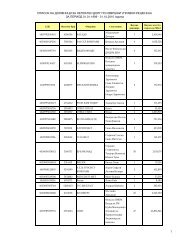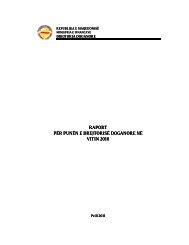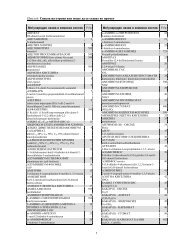Customs Declaration Processing System Detailed User and ...
Customs Declaration Processing System Detailed User and ...
Customs Declaration Processing System Detailed User and ...
You also want an ePaper? Increase the reach of your titles
YUMPU automatically turns print PDFs into web optimized ePapers that Google loves.
DETAILED USER & TECHNICAL REQUIREMENTS FOR CDPS<br />
AND USE-CASE MODELS<br />
Ref: PHASE V<br />
4.4.4 Business Process <strong>and</strong> Security Requirements<br />
- Data management = Central administration of Macedonian customs administration shall create <strong>and</strong><br />
maintain the Tarim (TARIC) data.<br />
- Data dissemination = A daily update file is produced <strong>and</strong> made available for all Macedonian customs<br />
offices, Data Dissemination <strong>System</strong> (to traders <strong>and</strong> associations) <strong>and</strong> other Macedonian ministries.<br />
- Data consultation = Other Macedonian ministries <strong>and</strong> applications consult the TARIC data.<br />
- Confidentiality = All parties within both the Central administration of Macedonian customs<br />
administration <strong>and</strong> all Macedonian customs offices must ensure that only legitimate users are able to<br />
gain access to the confidential Tarim (TARIC) data.<br />
4.5 Accounting management system sub-application<br />
4.5.1 General conditions of Accounting management system sub-application<br />
- The revenue collection is one of their primary functions. Therefore the automation of the revenue<br />
accounting process via Accounting management system sub-application is an essential part of any<br />
integrated <strong>Customs</strong> IT system <strong>and</strong> it should be closely connected with CDPS. The Accounting<br />
management system sub-application (revenue accounting system) must:<br />
o account for all duties collected <strong>and</strong> refunded;<br />
o provide a mechanism for the collection <strong>and</strong> refund of duties at the time of clearance;<br />
o provide a mechanism for the deferment of duty payments for a specified period.<br />
- The application of a deferred payments system requires the establishment of a trader registration system.<br />
This controls the guarantees <strong>and</strong> identifies the revenues payable over a specified period of time.<br />
- In the Accounting management system sub-application (revenue accounting system) the following tasks<br />
are ideally suited to the application of IT:<br />
o automated control of duty security, i.e. the communication with the Guarantee management subapplication;<br />
o maintenance of the traders' deferred payment accounts; <strong>and</strong><br />
o production of fast <strong>and</strong> accurate revenue accounts.<br />
- At the time of clearance, duty can be collected by accepting cash, cheques, bank drafts, credit cards <strong>and</strong><br />
debit cards from the declarant <strong>and</strong>/or by using real-time electronic funds transfer payment methods.<br />
- Macedonian <strong>Customs</strong> Authorities must be able to reconcile the actual duties collected with the total<br />
duties calculated by the CDPS (goods declaration system). Typically, the system should record the actual<br />
duty amounts collected for each transaction together with the MRN <strong>and</strong> the means of payment.<br />
Normally, the type of duty (customs duty, VAT, excise, export tax, etc.) with the corresponding amount<br />
is also recorded, thus allowing the Macedonian <strong>Customs</strong> Authorities to determine for each declaration<br />
how much duty is collected for each duty type.<br />
- The acceptance of payment cards means that Macedonian <strong>Customs</strong> Authorities shall install the necessary<br />
technology linking the <strong>Customs</strong> offices to the banking system, in order to validate the details on the card<br />
<strong>and</strong> ensure acceptance of the total duty amounts.<br />
- The application of a deferred payments system differs significantly from the collection of duty at the<br />
time of clearance. Such systems are based on maintaining individual accounting information for each<br />
approved declarant or trader. Normally, a maximum limit on deferred duty is agreed between the trader,<br />
Macedonian <strong>Customs</strong> Authorities <strong>and</strong> the trader’s bank through the issuing of a guarantee. Details of this<br />
amount, together with details of each transaction (MRN - <strong>Customs</strong> declaration number <strong>and</strong> duty<br />
payable), are maintained on a database, which is linked to the traders registration system. With the<br />
implementation of an automated revenue collection system, a national deferred payment system can be<br />
easily administered.<br />
Page 133/276



